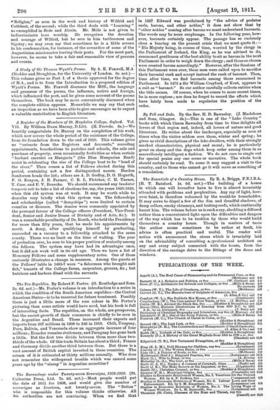The Baronetage under. Twenty - seven Sovereigns, 1308 - 1910. (St. Catherine Press, Ltd.
7s. 6d. net.)—Most people would put the date of 1611 for 1308, and would give the number of sovereigns as fourteen, not twenty-seven. The "Briton" who is responsible for this volume thinks otherwise. All his authorities are not convincing. When we find that in 1327 Edward was proclaimed by "the advice of prelates earls, barons, and other nobles," it does not show that by "other nobles" coming after barons we must understand baronets. The words may be mere surplusage. In the following year, how- ever, baronets certainly appear. The passage has so curiously close a bearing on the present crisis that we must quote it :— " His Majesty being, in course of time, worried by the clergy in the Parliament of Ireland, the King, as he was advised to do, summoned gentlemen of the best ability to sit as barons in the next Parliament in order to weigh down the clergy ; and those so chosen were created barons accordingly." However, after the Sessions of this Parliament were over, these men were called upon to sacrifice their baronial rank and accept instead the rank of baronet. Then, time after time, we find baronets among those summoned to Parliament. In 1475 a Sir William Crayford, of Kent, appears in a suit as "baronet" So our author carefully collects entries when the title occurs. Of course, when he comes to more recent times, he is more copious ; nor does he forget to record the efforts which have lately been made to regularize the position of the order.


































 Previous page
Previous page